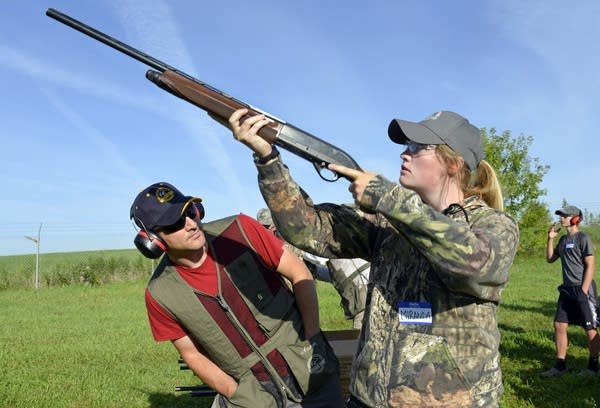In NW Minn., keeping duck hunting alive one summer camper at a time

Go Deeper.
Create an account or log in to save stories.
Like this?
Thanks for liking this story! We have added it to a list of your favorite stories.
"Relax. Breathe through the call. Let your jaw drop — awww. You're taking a big yawn."
John Schroers' instructions could have fit easily into a music lesson, or a yoga class. Instead, Schroers stood in an open-air classroom overlooking a wetland, teaching the subtleties of a good goose call. His students, a dozen 13- to 15-year-olds, worked to mimic the call.
"They're doing everything I'm doing and they don't even realize it yet," said Schroers, who's been teaching the waterfowl camp for 25 years at the Prairie Wetland Learning Center and was pleased by this group's progress. "It just brings a big smile to my face."
Goose calling is one of many classes crammed into the weeklong camp sponsored by the Minnesota Waterfowl Association. Each summer, 50 teens come to learn everything about waterfowl hunting from calls to prairie ecology, outdoor ethics and shooting.
Turn Up Your Support
MPR News helps you turn down the noise and build shared understanding. Turn up your support for this public resource and keep trusted journalism accessible to all.

Beyond the fun, camp leaders see it as a path to reviving a tradition that's been declining for decades in Minnesota. In the past 10 years alone, the number of duck hunters has fallen by nearly 20,000, or about 23 percent; the number of Canada goose hunters has fallen by about 25,000 in that time, a nearly 40 percent drop, according to Minnesota Department of Natural Resources estimates.
The data suggest a need to get younger hunters into the blind, which makes the hands-on experiences at Prairie Wetland that much more vital.
The program is limited to 50 students, all young teens, who apply and write an essay about why they want to come to camp. They must complete a firearm safety class. No cellphones are allowed to keep the focus on outdoor activity. Students stay in dorms operated the learning center.
Schroers and other instructors all volunteer their time and provide one-on-one learning. That includes the goose call class.
"Not everybody can do it and it really actually takes skill," said 15-year-old Robert Bastyr, a saxophone player who quickly saw the similarities between woodwinds and waterfowl calls. "You don't want to give too little air where you can't hear it, but you don't want give too much where it squeaks."
Schroers picked up on Robert's skills during the class. At one point they went toe-to-toe, heads bobbing and cheeks pumping as they answered each other's goose calls.
"Nice jam session, man. Isn't that fun?" Schroers exclaimed with a big smile and hearty laugh. "We got our cool rays on, we musicians, we jamming."

Campers also get to make another kind of noise during the week, firing more than 9,000 shotgun rounds at clay targets.
Maddie Broton-Anderson tracked a clay disc across the sky with the barrel of her gun, fired and missed. "A little bit behind," said Maddie, 15, from Owatonna, Minn.
"You were there but then you kind of slowed down," said shooting instructor Steve Pagel who hovered just over her shoulder offering advice.
When she hit three targets in a row, Pagel got a hug.
Already a committed hunter, Maddie said she saw it as part of her family bond. "When someone hunts, it's like that's your time between you and nature," she said. "Like, nothing can beat that."

Pagel, who's president of the Minnesota Waterfowl Association, hopes to sell a new generation on hunting and conservation and is tickled to see more girls attending a camp that was once only boys. The DNR says women are hunting in greater numbers in Minnesota.
"We've had a lot of girls beat the boys," chuckled Pagel. "It's fun seeing that happen. When you see a girl that hasn't shot hardly at all, and the boy is a little bit on the cocky side, and the girl just smokes 'em."
While the camp is designed to excite kids about hunting, it's also helping cultivate the next generation of hunter-conservationists, said Minnesota Waterfowl Association director Brad Nylin, who coordinates the summer program and raises the $46,000 to pay all expenses for campers.

"If they don't know anything about duck hunting, or anything to do with waterfowl," he said, "they're going to learn that habitat is important, that joining organizations and getting involved is important."
Miranda Danielson plans to go waterfowl hunting for the first time this fall. She took up trap shooting as a school sport a couple of years ago in Alexandria, Minn.
"I love it. It's my passion. I feel really comfortable and it's something I'm confident in," said Danielson, who saved $1,000 last year to buy a shotgun.
"I've really put a lot into my shooting. But I love the outdoors too. So, this camp is like perfect because it's got a mix of the shooting, the outdoors," she said. "There's waterfowl ID. We're going to be banding ducks, it's awesome."


